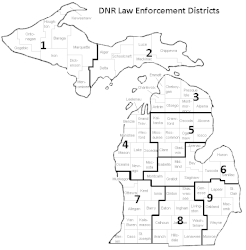Michigan Conservation Officers
| Michigan Department Of Natural Resources Law Enforcement Division | |
|---|---|
| Abbreviation | LED |

Michigan Department of Natural Resources Law Enforcement Division Door Decal
|
|
| Agency overview | |
| Formed | 1887 |
| Employees | 239 |
| Annual budget | $40,400,000.00 (2015-2016) |
| Legal personality | Governmental: Government agency |
| Jurisdictional structure | |
| Operations jurisdiction* | State of Michigan, USA |
 |
|
| Map of Michigan Department Of Natural Resources Law Enforcement Division's jurisdiction. | |
| Size | 97,990 square miles (253,800 km2) |
| Population | 9,883,640 (2010 est.) |
| General nature | |
| Operational structure | |
| Headquarters | Lansing, Michigan |
| Peace Officer Conservation Officers | 219 |
| Agency executive | Gary Hagler, Director |
| Districts | 9 |
| Website | |
| http://www.michigan.gov/dnr/0,4570,7-153-42199---,00.html | |
| Footnotes | |
| * Divisional agency: Division of the country, over which the agency has usual operational jurisdiction. | |
Michigan Conservation Officers are conservation officers who are the enforcement branch of the Michigan Department of Natural Resources. Their primary duty is to enforce the environmental laws in the State of Michigan. Michigan Conservation Officers are fully commissioned peace officers and are empowered to enforce all the laws of the state of Michigan, with the exception of some traffic law. The definition of peace officer under traffic law does not include 'Conservation Officer' and as such, Conservation Officer's are only able to execute traffic stops for violations of general state law or acts ancillary to hunting/conservation law.
The Michigan Conservation Officers work with local police departments, sheriff's departments, the Michigan State Police, the U.S. Coast Guard, the U.S. Customs and Border Protection, the U.S. Forest Service Law Enforcement Division and other state, federal, and foreign agencies.
"Early Michigan citizens recognized the rich and vast natural treasures surrounding them and the need for their conservation and protection. The result was the nation's first salaried game warden, William Alden Smith, who was appointed in 1887.
Warden Smith was charged principally with appointing deputies for the enforcement of fish and game regulations. The mission of the DNR Law Enforcement Division has expanded substantially since Smith's appointment and now includes protection of all natural resources and the environment, as well as the health and safety of the public.
Today, "Conservation Officers" and other noncommissioned support staff direct their efforts to a wide array of responsibilities designed to support this broad mission. Enforcement, Education, Recreational Safety and Public Outreach represent some of the general categories of services.
Michigan Conservation Officers fall under the Law Enforcement Division of the Michigan Department of Natural Resources. Some states including Oregon and Alaska include environmental law enforcement under the Department of State Police. This allows resources to be combined and saves the states money by eliminating duplicate services. Combining the two departments also has some disadvantages. Most states don't combine the two departments. The Law Enforcement Division is broken down into a number of subsections. The subsections include:
...
Wikipedia
